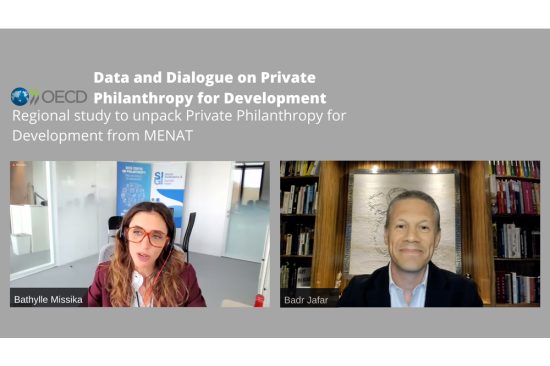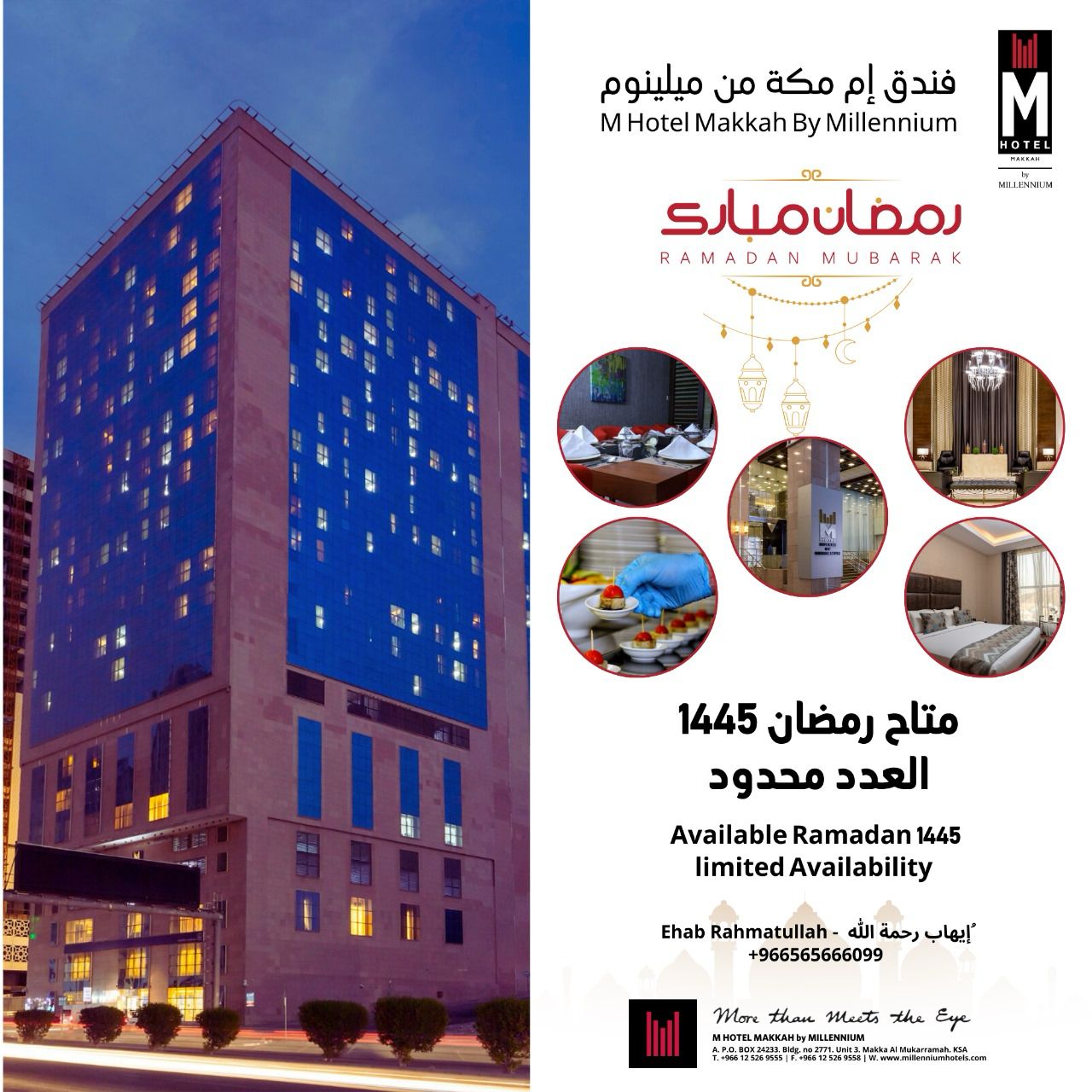{:en}Dubai, United Arab Emirates -The Organisation for Economic Co-operation and Development (OECD) hosted a dialogue on the role of private philanthropy in the Middle East North Africa (MENA) region. The discussion, titled, “Data and Dialogue on Private Philanthropy for Development: Regional study to unpack Private Philanthropy for Development from MENA,” convened expert participants from across businesses, foundations, government, and philanthropy, to share perspectives. Speakers included Natasha Ridge, Executive Director of the Sheikh Saud bin Saqr Al Qasimi Foundation for Policy Research, Badr Jafar, CEO of Crescent Enterprises, Founder of the Pearl Initiative, and Founding Patron of the Centre for Strategic Philanthropy based at the University of Cambridge, and Sonia Ben Jaafar, Executive Director of the Abdulla Al Ghurair Foundation.

On the road to achieving the United Nations’ Sustainable Development Goals by 2030, private philanthropy is playing an increasingly critical role, providing targeted, localised, and nimble resources and support to communities in need. In December 2021, OECD released its second edition of “Private Philanthropy for Development,” a report which aims to meet the growing demand for open, reliable, and comparable data on philanthropy by analysing and comparing philanthropic activity across geographies and, sectors.
Of the various findings and recommendations in OECD’s report, the organisation emphasises a need to invest further in rigorous learning and recommends that organisations share data on philanthropic giving to better identify gaps, avoid redundancies, and inform the broader public. The report identified that private philanthropy for development, from 205 foundations worldwide, amounted to USD 42.5 billion between 2016 and 2019, an annual average of USD 10.6 billion.
In his keynote remarks, Badr Jafar, CEO of Crescent Enterprises, Founder of the Pearl Initiative, and Founding Patron of the Centre for Strategic Philanthropy based at the University of Cambridge, said, “Availability of capital is not the obstacle. The sheer scale of philanthropic capital alone has the potential to deliver lasting results. It is the strategic deployment of this capital that we must learn to unlock.” He added, “Within our region, and all global markets, philanthropists are uniquely equipped to help innovate solutions to the social challenges that confront our communities. We just need the right tools to do so – digital infrastructure, transparency, trust, data, are all critical aspects with immense room for growth.”
Jafar recently partnered with the University of Cambridge to establish a Centre for Strategic Philanthropy at Cambridge University, dedicated to enhancing the impact of strategic philanthropy through rigorous research, executive education, and the convening of diverse voices both within and from the world’s emerging markets, including in Africa, Developing Asia, and the Middle East. More recently, he partnered with NYU-Abu Dhabi on a similar initiative focused on the MENA region.
Today, the world’s top 30 fastest growing economies are in emerging markets, including in the MENA region. According to Knight Frank’s latest Wealth Reports, ultra-high net-worth wealth populations in Africa and the Middle East are expected to rise by 33% and 24.6%, respectively, by 2025. Shifting trends in wealth, coupled with emerging trends in technology and innovation, signal a major opportunity to unlock high-impact, strategic philanthropy in the region. Mr Jafar’s keynote speech was followed by a panel discussion that featured Noura Selim, Executive Director of the Sawiris Foundation for Social Development, Naila Farouky, CEO of the Arab Foundations Forum, Sonia Ben Jaafar, Executive Director of the Abdulla Al Ghurair Foundation, and Ranya Saadawi, Executive Director of the Pearl Initiative. Among the topics raised, the panel discussed the effect cross-sector networks can by harvesting different areas of expertise and promoting better collaboration.
Ranya Saadawi, Executive Director of the Pearl Initiative, the leading non-profit organisation focusing on the promotion corporate accountability and transparency across the Gulf region, elaborated, “When it comes to building resilient and sustainable economies and societies, corporate governance is essential. This, of course, extends to private philanthropy, which is essentially private capital for public good. The Pearl Initiative works tirelessly to create spaces for leading corporate and family business donors in the region to convene and share experiences and learnings with one another. When it comes to delivering results-driven corporate social responsibility and corporate philanthropic activities, experiential data is vital for the sector’s future planning and success.”
The OECD dialogue concluded that further investments in learning, transparency, and internal capacities can greatly help to enhance philanthropy’s contribution to development, and therefore towards building a more sustainable future within the region.
About the Pearl Initiative
The Pearl Initiative is the Gulf region’s leading independent, non-profit organisation working to promote the business case for a corporate culture of accountability and transparency. The organisation was established in 2010 by regional business leaders in cooperation with the United Nations Office for Partnerships. The Pearl Initiative is the only private, non-profit Gulf business network to receive special consultative status from the United Nations Economic and Social Council.
The Pearl Initiative runs a series of corporate governance-related programmes, including Anti-Corruption Best Practices, Diversity in Business Leadership, Governance in MSMEs, Governance in Family Firms, Governance in Tech, and Governance in Philanthropy. The organisation also conducts locally relevant research, hosts workshops and executive education training sessions, and convenes business leaders, policy makers, students, and non-profit executives to encourage a proactive approach to implementing best practices in the workplace across the Gulf region.
With a growing network of over 40 regional and international partners, the Pearl Initiative continues to strive to be the leading business-led action-oriented platform to advance corporate governance as a key driver of competitiveness, job creation, and sustainable economic growth across the Gulf region.
For more information, please visit www.pearlinitiative.org and check out our Social Media Channels: @PearlInitiative on Facebook, YouTube, and Twitter and @ThePearlInitiative on LinkedIn.
*Source: AETOSWire{:}{:ar}دبي، الإمارات العربية المتحدة – عقدت منظمة التعاون والتنمية الاقتصادية جلسة حوار عن الأعمال الخيرية الخاصة في منطقة الشرق الأوسط وشمال أفريقيا، تضمنت نقاشاً بعنوان “بيانات وحوار عن الأعمال الخيرية الخاصة من أجل التنمية: دراسة إقليمية عن الأعمال الخيرية الخاصة المكرسة للتنمية في الشرق الأوسط وشمال أفريقيا”، تحدث فيه خبراء من شركات ومؤسسات وجهات حكومية والقطاع الخيري عن رؤاهم ووجهات نظرهم. ومن بين المتحدثين ناتاشا ريدج، المديرة التنفيذية لمؤسسة الشيخ سعود بن صقر القاسمي لبحوث السياسة العامة؛ وبدر جعفر، الرئيس التنفيذي لشركة الهلال للمشاريع ومؤسس مبادرة بيرل والراعي المؤسس للمركز الاستراتيجي للأعمال الخيرية في جامعة كامبريدج؛ وسونيا بن جعفر، المديرة التنفيذية لمؤسسة عبد الله الغرير.

وفي سياق الجهود المبذولة لتحقيق أهداف التنمية المستدامة للأمم المتحدة بحلول 2030، يؤدي القطاع الخيري الخاص دوراً متزايد الأهمية بتوفير موارد مرنة تخصص محلياً لتوفير احتياجات المجتمعات المحتاجة. وفي ديسمبر 2021، أصدرت منظمة التعاون والتنمية الاقتصادية النسخة الثانية من تقرير “العمل الخيري الخاص من أجل التنمية” تلبيةً للطلب المتنامي على بيانات موثوقة وشفافة عن الأعمال الخيرية، وذلك بتحليل الأعمال الخيرية المنفذة في مختلف المناطق والقطاعات والمقارنة فيما بينها.
وخلص التقرير إلى تأكيد منظمة التعاون والتنمية الاقتصادية الحاجة إلى زيادة الاستثمار في التعليم المكثف. وأوصى المنظمات بمشاركة بيانات أعمالها الخيرية، إذ يتيح ذلك تحديد الثغرات وتلافي التكرار وتوعية العامة. ووجد التقرير أن الأعمال الخيرية الخاصة التي تكرسها 205 مؤسسة في العالم لدواعي التنمية، قد بلغت قيمتها 42.5 مليار دولار أمريكي ما بين 2016 و2019، بمعدل سنوي يساوي 10.6 مليار دولار أمريكي.
وقال بدر جعفر، الرئيس التنفيذي للهلال للمشاريع ومؤسس مبادرة بيرل والراعي المؤسس للمركز الاستراتيجي للأعمال الخيرية في جامعة كامبريدج، في كلمته الرئيسية: “ليس توفر رأس المال هو المشكلة، فرؤوس الأموال المتاحة لوحدها قادرة على تحقيق نتائج ستبقى آثارها على المدى الطويل. ما نحتاج إليه هو التوظيف الاستراتيجي لرأس المال هذا.” وأضاف: “في منطقتنا، كما في الأسواق العالمية، يستطيع المانحون وفاعلو الخير المساهمة في ابتكار حلولٍ للتحديات الصعبة التي تواجهها مجتمعاتنا. وكل ما نحتاج إليه هو الأدوات المناسبة التي تساعدنا على تحقيق ذلك – بنية تحتية رقمية، وشفافية، وثقة، وبيانات، هذه العوامل جميعها أساسية وفيها مجال واسع جداً للنمو.”
ويُذكر أن جعفر قد تعاون مؤخراً مع جامعة كامبريدج في تأسيس المركز الاستراتيجي للأعمال الخيرية في جامعة كامبريدج، وهو مركز مكرس لتحسين أثر العطاء الاستراتيجي عن طريق الأبحاث المكثفة والتعليم التنفيذي وحشد الجهود الخيرية في الأسواق الناشئة وفي الاقتصادات الأخرى، بما فيها الدول الأفريقية ودول آسيا النامية والشرق الأوسط. وتعاون جعفر أيضاً في الآونة الأخيرة مع جامعة نيويورك بأبوظبي في تنفيذ مبادرة مماثلة تركز على منطقة الشرق الأوسط وشمال أفريقيا.
واليوم، يقع أسرع 30 اقتصاد نمواً في العالم في الأسواق الناشئة، ومنها منطقة الشرق الأوسط وشمال أفريقيا. ووفقاً لآخر تقارير الثروة الصادرة عن مؤسسة نايت فرانك، من المتوقع توسع شريحة أصحاب الثروات الضخمة في أفريقيا والشرق الأوسط بحلول 2025 بنسبة 33% و24.6% على التوالي. وتوحي هذه التغيرات الاقتصادية، إلى جانب المستجدات التكنولوجية والابتكارات، بوجود فرص هائلة لتحقيق أفضل النتائج من الأعمال الخيرية الاستراتيجية عالية التأثير في المنطقة.
وأعقبت الكلمة الرئيسية التي ألقاها بدر جعفر جلسة نقاش ضمت نورا سليم، المديرة التنفيذية لمؤسسة ساويرس للتنمية الاجتماعية؛ ونائلة فاروقي، الرئيسة التنفيذية لمنتدى المؤسسات العربية؛ وسونيا بن جعفر، المديرة التنفيذية في مؤسسة عبد الله الغرير؛ ورانيا السعداوي، المديرة التنفيذية في مبادرة بيرل. ومن بين المواضيع التي تناولها النقاش التأثير الشديد الذي يمكن أن تحققه الشبكات متعددة القطاعات بالاستفادة من تنوع مجالات الاختصاص فيها وتحسين مستوى التعاون فيما بينها.
وقالت رانيا السعداوي، المديرة التنفيذية في مبادرة بيرل، وهي منظمة غير ربحية رائدة مهمتها تعزيز المساءلة والشفافية في شركات منطقة الخليج: “يتطلب بناء اقتصادات ومجتمعات مرنة ومستدامة أن تكون الحوكمة المؤسسية عاملاً أساسياً في منهجيات العمل. وينطبق ذلك بالطبع على القطاع الخيري الخاص الذي يعتبر في جوهره رؤوس أموالٍ خاصة ٍتنفق لخدمة المجتمعات والصالح العام. تتيح مبادرة بيرل المانحين من الشركات العائلية والمؤسسات في المنطقة الاجتماع وتبادل التجارب والدروس. وليتمكن القطاع الخاص من تأدية مسؤوليته الاجتماعية المؤسسية وتنفيذ مبادرات مؤسسية خيرية مؤثرة بحق، سيحتاج إلى بيانات فعلية وواقعية ليتقن التخطيط وينجح في مساعيه المستقبلية.”
واختُتِم الحوار بالإشارة إلى ضرورة تكثيف الاستثمار في التعلم والشفافية وتنمية القدرات الداخلية، مؤكداً أهمية ذلك لتعزيز مساهمة العمل الخيري ودوره في مساعي التنمية، وبالتالي بناء مستقبل أكثر استدامة للمنطقة.
* المصدر: “ايتوس واير”{:}














